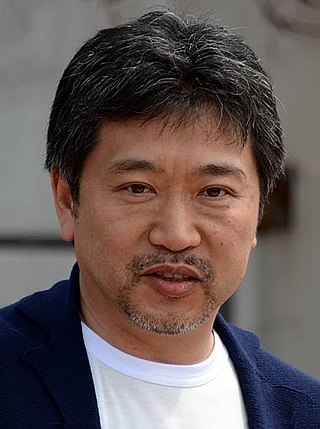
Maggie Cheung Man-yuk is a Hong Kong former actress. Raised in Hong Kong and Britain, she started her career after placing second in 1983's Miss Hong Kong Pageant. She achieved critical success in the late 1980s and into the early 2000s, before taking a break from acting following her last starring role in 2004. She rarely makes public appearances except for fashion events and award ceremonies.

Farewell My Concubine is a 1993 Chinese-Hong Kong epic historical drama film directed by Chen Kaige, starring Leslie Cheung, Gong Li and Zhang Fengyi. Adapted for the screen by Lu Wei, based on the novel by Lilian Lee, the film is set in a politically tumultuous 20th-century China, from the early days of the Republic of China to the aftermath of the Cultural Revolution. It chronicles the troubled relationships amongst two lifelong friends, the Peking opera actors Cheng Dieyi (Cheung) and Duan Xiaolou (Zhang), and Xiaolou's wife Juxian (Gong).

Chang Chen is a Taiwanese actor. He was born in Taipei, Taiwan. His father Chang Kuo-chu and his brother Hans Chang are also actors.

Chen Kaige is a Chinese filmmaker and a leading figure of the fifth generation of Chinese cinema. His films are known for their visual flair and epic storytelling. Chen won the Palme d'Or at 1993 Cannes Film Festival and the International Federation of Film Critics (FIPRESCI) Award in 1993 for directing Farewell My Concubine.

Hirokazu Kore-eda is a Japanese film director, producer, screenwriter, and editor. He began his career in television and has since directed more than a dozen feature films, including Nobody Knows (2004), Still Walking (2008), and After the Storm (2016). He won the Jury Prize at the 2013 Cannes Film Festival for Like Father, Like Son and won the Palme d'Or at the 2018 Cannes Film Festival for Shoplifters.

The cinema of Taiwan or Taiwan cinema is deeply rooted in the island's unique history. Since its introduction to Taiwan in 1901 under Japanese rule, cinema has developed in Taiwan under ROC rule through several distinct stages, including taiyu pian of the 1950s and 1960s, genre films of the 1960s and 1970s, including jiankang xieshi pian, wuxia pian, aiqing wenyi pian, zhengxuan pian, and shehui xieshi pian, Taiwan New Cinema of the 1980s, and the new wave of the 1990s and afterwards. Starting in the second decade of the new millennium, documentary films also became a representative part of Taiwan cinema.

Lin Li-hui, better known by her stage name Shu Qi, is a Hong Kong–Taiwanese actress and model.

Hou Hsiao-hsien is a retired Mainland Chinese-born Taiwanese film director, screenwriter, producer and actor. He is a leading figure in world cinema and in Taiwan's New Wave cinema movement. He won the Golden Lion at the Venice Film Festival in 1989 for his film A City of Sadness (1989), and the Best Director award at the Cannes Film Festival in 2015 for The Assassin (2015). Other highly regarded works of his include The Puppetmaster (1993) and Flowers of Shanghai (1998).

Pernilla August is a Swedish actress, director and screenwriter. Being one of Sweden's leading actresses and a longtime collaborator with director Ingmar Bergman, she won the Best Actress Award at the 1992 Cannes Film Festival for her role in his The Best Intentions. She is best known internationally for portraying Shmi Skywalker in Star Wars: Episode I – The Phantom Menace and Star Wars: Episode II – Attack of the Clones.

Three Times is a 2005 Taiwanese film directed by Hou Hsiao-hsien. It consists of three separate stories of romance, set in different eras, using the same lead actors, Shu Qi and Chang Chen. In "A Time for Love," set in 1966, a soldier (Chang) meets an alluring pool-hall hostess (Shu). "A Time for Freedom," set in 1911, focuses on a courtesan's relationship with a freedom fighter during the Japanese occupation of Taiwan. In "A Time for Youth," set in 2005, a singer forsakes her female lover for a photographer with whom she's having an affair.

Flowers of Shanghai is a 1998 Taiwanese drama film directed by Hou Hsiao-hsien. It is based on the novel The Sing-song Girls of Shanghai (1892) by Han Bangqing, which was originally written in the Wu language (吳語) and translated into Mandarin Chinese by Eileen Chang. The film stars Tony Leung as a wealthy patron and Michiko Hada, Annie Shizuka Inoh, Shuan Fang, Jack Kao, Carina Lau, Rebecca Pan, Michelle Reis and Vicky Wei as "flower girls" in four high-end Shanghai brothels. It was voted the third best film of the 1990s in the Village Voice Film Poll conducted in 1999. The film was selected as the Taiwanese entry for the Best Foreign Language Film at the 71st Academy Awards.

Wu Nien-jen is a Taiwanese screenwriter, director, and writer. He is one of the most prolific and highly regarded scriptwriters in Taiwan and a leading member of the New Taiwanese Cinema, although he has also acted in a number of films. He starred in Edward Yang's 2000 film Yi Yi. Wu is a well-known supporter of the Democratic Progressive Party and has filmed commercials for the party.

Jaco Van Dormael is a Belgian film director, screenwriter and playwright. His films especially focus on a respectful and sympathetic portrayal of people with mental and physical disabilities.
Sun Nan is a pop singer from Dalian in mainland China. His songs include "Be there or Be Square", "The Wind Goes to North", "Save", and his song for the 2008 Summer Olympics, "Forever Friends". Sun's album Crescent Moon was released in 1990. He has released 12 albums with over 10 million sales in total. Since 2012, Sun has judged or hosted numerous singing competitions in China.

The Personals is a 1998 Taiwanese comedy-drama film directed and co-written by Chen Kuo-fu, based on Jade Y. Chen's 1992 novel of the same name. The film follows a career woman as she encounters a diverse bunch of men after placing a personal advertisement in the newspaper. It was screened in the Un Certain Regard section at the 1999 Cannes Film Festival. Liu won Best Actress at the 1999 Asia-Pacific Film Festival.
Chen Kuo-fu is a Taiwanese film director, screenwriter and producer. His film The Personals was screened in the Un Certain Regard section at the 1999 Cannes Film Festival.

Ilo Ilo is a 2013 Singaporean drama film. The debut feature of director Anthony Chen, the film features an international cast, including Singaporean actor Chen Tianwen, Malaysian actress Yeo Yann Yann, Filipino actress Angeli Bayani, and debut of child actor Koh Jia Ler.

Michelle Chen Yanxi is a Taiwanese actress and singer. Chen is best known for starring in the 2011 film You Are the Apple of My Eye, which broke box office records for Chinese-language films in mainland China, Taiwan, Hong Kong and Singapore. Chen is also known for the films Hear Me (2009), Badges of Fury (2013), Pali Road (2015), as well as the TV series The Romance of the Condor Heroes (2014).
"A felicidade" ("Happiness") is a bossa nova song by Antônio Carlos Jobim, with lyrics by Vinícius de Moraes, composed in 1958 for the French film Orfeu Negro.
Chen Ming-chang (陳明章) is a Taiwanese folk singer, guitarist, Taiwanese yueqin player, composer, and producer born in Beitou. He is known for writing scores for the Hou Hsiao-Hsien films Dust in the Wind (1985) and The Puppetmaster (1993), as well as for songs such as "She Is Our Darling" and "Wandering to Tamsui". He is stylistically known for singing primarily in Taiwanese Hokkien, incorporating traditional styles and instruments into his music, as well as songs that represent the Taiwanese underclass.
















